
Stenocara gracilipes is a species of beetle that is native to the Namib Desert in southern Africa. This is one of the most arid areas of the world, receiving only 1.4 centimetres (0.55 in) of rain per year. The beetle is able to survive by collecting water on its bumpy back surface from early morning fogs.
Trachelostenus is a genus of darkling beetles in the family Tenebrionidae. It is native to the Valdivian forests of Chile, and has at least two species, T. inaequalis (Solier) and T. fascicularis (Philipp). It was historically considered the only member of the family Trachelostenidae, but a 2015 study sunk the genus into the tenebrionid subfamily Tenebrioninae.

Stenocara dentata, the long-legged darkling beetle, is an insect of darkling beetle family found in southern Africa. The beetle stands in a head down posture on sand dunes to catch the morning mist which collects in drops on its body and slides into its mouth. It is large enough to crawl out of the trap of the plant, Hydnora africana, unlike smaller beetles which remain trapped for several days.

The Sepidiini is a tribe of ground-dwelling darkling beetles (Tenebrionidae), that occurs across Africa, the Mediterranean Basin, the Arabian Peninsula and Mesopotamia. It is composed of many hundreds of species. The larvae of some species are known to damage crops.

Scotaeus is a genus of darkling beetles.
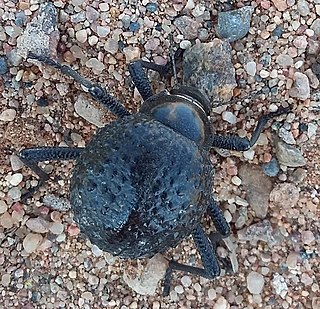
Physosterna cribripes, the desert toktokkie or woestyntoktokkie, is a flightless species of desert-dwelling darkling beetle or Tenebrionid found along the West coast of Namibia and Angola. This species has a body length of some 18.4 mm (0.72 in) and a mass of 402 mg (6.20 gr).

Renatiella is a genus of diurnal, herbivorous beetles, which is found from East to southern Africa.

Platydema is a genus of darkling beetles in the family Tenebrionidae. There are at least 60 described species in Platydema.

Alphitobius is a genus of darkling beetles in the family Tenebrionidae. There are about 18 described species in Alphitobius.

Molurina is a subtribe of darkling beetles in the family Tenebrionidae. There are 28 genera and 579 described species and subspecies in subtribe Molurina. The type genus for this subtribe is Moluris. These beetles are widely distributed through the Afrotropics, with the exception of western Africa.
Oxurina is a subtribe of darkling beetles in the family Tenebrionidae. There are about 8 genera and more than 50 described species in Oxurina, found in southern and central Africa.
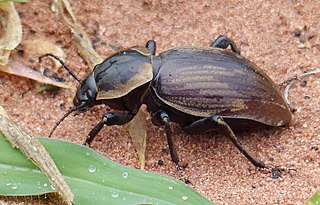
Phanerotomeina is a subtribe of darkling beetles in the family Tenebrionidae. There are about 5 genera and more than 150 described species in Phanerotomeina, found mainly in the southern part of the Afrotropics. Only two species were described north of the equator.

Trachynotina is a subtribe of darkling beetles in the family Tenebrionidae. There are about 10 genera and more than 170 described species in Trachynotina, found in southern Africa. Although Sepidiini species attract the attention of enthusiasts due to their outstanding morphology and behaviour, the group lacks comprehensive revisions at all taxonomic levels.

Phrenapatinae is a subfamily of darkling beetles in the family Tenebrionidae. There are more than 20 genera in Phrenapatinae, grouped into 3 tribes.
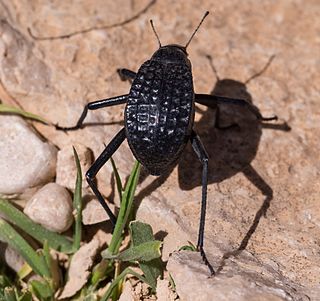
Adesmiini is a tribe of darkling beetles in the subfamily Pimeliinae of the family Tenebrionidae. There are about 11 genera in Adesmiini, found primarily in tropical Africa.
Phrynocarenum is a genus of darkling beetles in the family Tenebrionidae, found in the Neotropics.
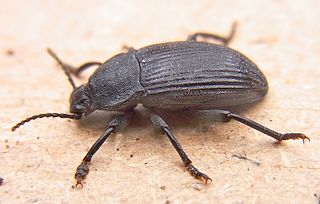
Dendarini is a tribe of darkling beetles in the family Tenebrionidae. There are more than 30 genera in Dendarini.

Pedinini is a tribe of darkling beetles in the family Tenebrionidae. There are about 19 genera in Pedinini.
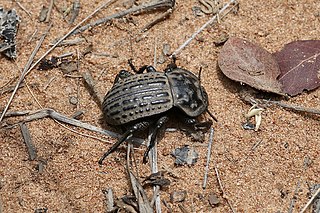
Platynotini is a tribe of darkling beetles in the family Tenebrionidae. There are more than 70 genera in Platynotini.

Mariazofia is a genus of ground-dwelling Afrotropical beetles in the family Tenebrionidae. They are among the largest of the darkling beetles. Like other genera within subtribe Molurina, adults of this genus engage in a behavior known as "substrate tapping", a form of sexual communication in which they produce vibrations by tapping their abdomen rhythmically on the ground to attract mates. Their common name, "tok-tok beetle" or "toktokkie beetle", is based on this behavior.



















